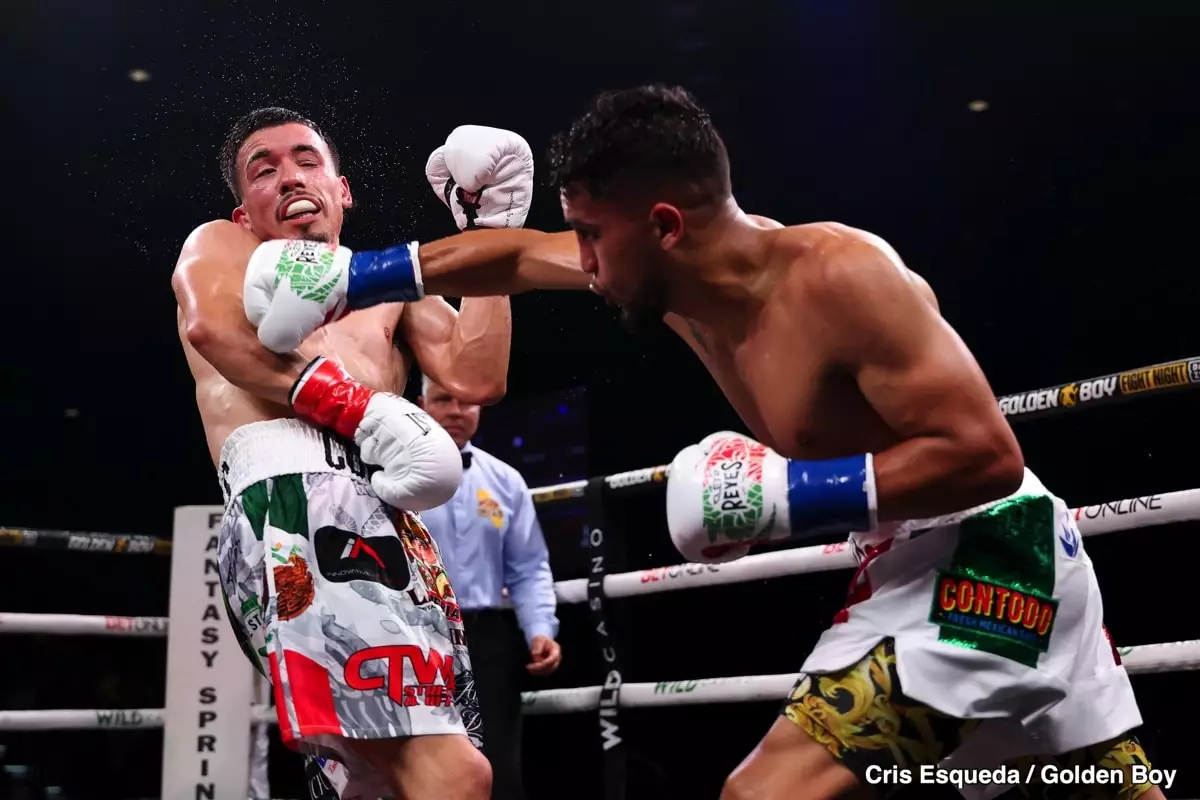Boxing, often dubbed the sweet science, can quickly turn bitter when decisions seem unjust and fighters leave the ring questioning whether their efforts were truly recognized. The recent Golden Boy Fight Night at Fantasy Springs embodied this paradox—showcasing raw talent, intense battles, and, ultimately, a judging controversy that cast a shadow over the event’s true spirit. While some fighters left with clear victories, others couldn’t escape the cloud of ambiguity, sparking debate about fairness, judging, and the very heart of the sport.
The main event between Manuel “Gucci Manny” Flores and Jorge Chavez exemplified boxing’s unpredictability—not just in outcomes but in the perception of effort versus favoritism. Their ten-round slugfest had spectators out of their seats, witnessing a gritty exchange where both fighters traded punches and momentum fiercely. Yet, when the judges’ tallies appeared, they handed in a draw—cards that read 93-97, 95-95, and 95-95—leaving many, including Chavez himself, incredulous. His fiery response—questioning whether the judges had watched the same fight—highlighted the disconnect that often exists between ring action and scorecards. Chavez’s claim that a cut resulted from a headbutt rather than a punch, along with his dismissive remark about Flores’s punching power, echoed frustration. His bold declaration of wanting to face Picasso next revealed a desire not just for another bout but for a fight that, perhaps, would finally settle some scores.
Flores’s reaction was straightforward but telling: a realization that early caution cost him, and perhaps, a lack of assertiveness in the later rounds. His comment, “Next time I won’t,” served as a gritty acknowledgment of the need to be more aggressive and less respectful of his opponent’s movement. While Chavez believed he had the upper hand—arguing Flores was unable to punch effectively—Flores contended that Chavez was simply elusive, avoiding engagement. This fundamental disagreement about who held the edge underscores a broader issue: in boxing, perception often becomes reality. When judges seemingly shrug at decisive efforts, fighters are left questioning the very foundation of fair play. The night’s outcome emphasized the importance of impartial and attentive scoring—an area where the sport’s integrity sometimes suffers due to subjective interpretations or, worse, complacency.
In the co-main event, the spotlight was intended to shine on Jordan Panthen, a promising talent known for his flashy style and knockout power. Instead, he encountered Phoenix’s Farid Ngoga, who displayed textbook boxing smarts—calm, disciplined, and disciplined enough to secure a majority decision. Ngoga’s strategic approach highlighted that boxing is as much about intelligence and composure as it is about raw power. The judges’ differing scores—one on the draw, two in Ngoga’s favor—mirrored the subtlety of his victory, contrasting sharply with the chaos of the main event. It served as a reminder that boxing remains a sport where patience and tactical thinking sometimes win out over flash and aggression.
The night also delivered compelling performances from other fighters, such as Cayden Griffiths and Leonardo “Bazooka” Sanchez. Griffiths, now 6-0 with six knockouts, demonstrated why he’s a rising star, dispatching David Ramirez with a thunderous hook that appeared personal and relentless. His continued escalation signifies a fighter eager to make his mark and prove that power combined with precision is a winning formula. Meanwhile, Sanchez, true to his nickname, unleashed relentless combos on Abraham Valdez in a fourth-round barrage that prompted the referee to step in. These decisive finishes underscore the importance of finishing strong and making every punch count—attributes that can define a fighter’s career trajectory.
Not all fights were about dominance or controversy. Fabian Guzman’s unanimous decision over Brian Arregui was a textbook display of consistency and skill. Their clean scores—from all three judges—offered clarity in a night rife with disputed outcomes. This bout served as a stark contrast to the chaos of earlier contests, reminding us that fairness, when achieved, forms the backbone of credibility in boxing.
The preliminaries, often overlooked, delivered their own moments of uncertainty and brilliance. Bryan Lua and Kevin Piedrahita’s draw illustrated how evenly matched fighters can result in a lack of decisive outcome, highlighting the importance of clear aggression and strategic mastery. Yet, Javier Meza’s straightforward victory over Cesar Villarraga, with scores 60-54, 59-55, and 60-54, reaffirmed that in boxing, discipline and consistency typically lead to victory—if the officials call it correctly.
This night not only reflected the physical spectacle of boxing but also laid bare the sport’s ongoing struggle with judgment and perception. Fighters poured their hearts into every punch, sometimes with enough power and skill to sway the audience, but the true dividends often depended on the judges’ interpretation. The controversy surrounding the Flores-Chavez main event exemplifies why integrity in scoring matters more than ever—fans, fighters, and promoters all deserve a clearer, more transparent system. Boxing’s future hinges on the balance between raw talent and fair adjudication, a lesson that was vividly reinforced on this unforgettable night.


Leave a Reply